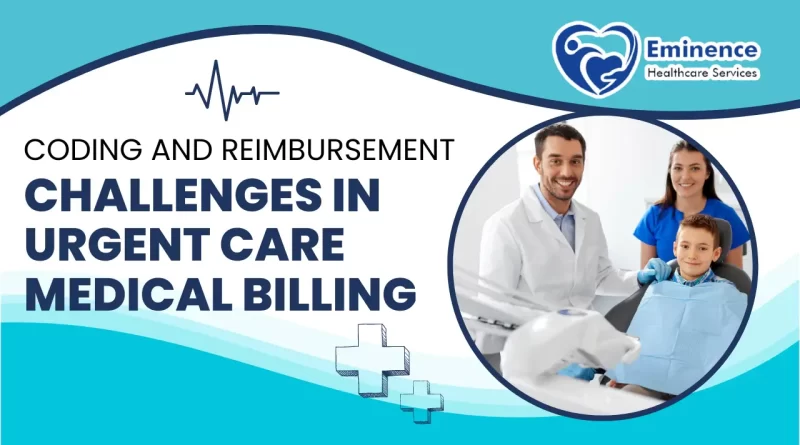Reimbursement Challenges in Urgent Care Medical Billing
This Article Was Originally Published By Eminence RCM
Urgent care centers have become vital in providing immediate care for non-life-threatening conditions, serving as a bridge between primary care and emergency rooms. However, the billing process for these centers is complex and fraught with challenges, particularly in coding and reimbursement. Understanding these challenges and implementing effective strategies is essential for maintaining the financial health of urgent care facilities. This article delves into the intricacies of coding and reimbursement in urgent care medical billing and highlights the key challenges and potential solutions.
The Importance of Accurate Coding in Urgent Care Billing
Accurate coding is the cornerstone of effective urgent care billing. It involves assigning standardized codes to diagnoses, procedures, and services provided during patient visits. These codes, primarily from the International Classification of Diseases (ICD-10), Current Procedural Terminology (CPT), and Healthcare Common Procedure Coding System (HCPCS), are used to communicate with insurance companies and ensure appropriate reimbursement.
However, coding in urgent care is particularly challenging due to the wide variety of services offered. From minor injuries and illnesses to diagnostic tests and treatments, each service requires precise coding to avoid errors that can lead to claim denials or underpayments.
However, coding in urgent care is particularly challenging due to the wide variety of services offered. From minor injuries and illnesses to diagnostic tests and treatments, each service requires precise coding to avoid errors that can lead to claim denials or underpayments.
Common Coding Challenges in Urgent Care
- High Volume of Services: Urgent care centers handle a high volume of patients, each with different ailments and requiring various services. This diversity necessitates a comprehensive understanding of coding guidelines to ensure every service is correctly coded.
- Frequent Changes in Coding Standards: Medical coding standards and guidelines frequently change, requiring ongoing education and training for coders. Keeping up with these changes is crucial to avoid outdated codes that can result in claim denials.
- Specificity Requirements: ICD-10 coding requires a high level of specificity. Coders must document and code the exact nature of the condition and the specific procedures performed, which can be challenging in a fast-paced urgent care environment.
- Bundling and Unbundling: Correctly identifying when services should be bundled or unbundled is essential. Errors in this area can lead to overbilling or underbilling, both of which can result in compliance issues and financial losses.
Reimbursement Challenges in Urgent Care
Beyond coding, urgent care centers face numerous challenges in securing reimbursement from insurance companies. These challenges can significantly impact the revenue cycle and financial stability of the practice.
- Claim Denials: One of the most common challenges is claim denials. These can occur for various reasons, including incorrect coding, lack of medical necessity, or incomplete documentation. Denial management is crucial to address these issues promptly and resubmit claims.
- Insurance Variability: Different insurance companies have varying coverage policies, reimbursement rates, and claim submission requirements. Navigating these differences and ensuring compliance with each payer’s guidelines can be time-consuming and complex.
- High Deductibles and Co-Pays: With the rise of high-deductible health plans, patients are responsible for a larger portion of their healthcare costs. Collecting these payments can be challenging, leading to increased accounts receivable and potential bad debt.
- Regulatory Compliance: Urgent care centers must adhere to various federal and state regulations regarding billing and reimbursement. Non-compliance can result in audits, penalties, and legal issues, further complicating the reimbursement process.
Strategies for Overcoming Coding and Reimbursement Challenges
To address these challenges, urgent care centers can implement several strategies to optimize their billing processes and maximize reimbursement.
- Invest in Training and Education: Regular training and continuing education for coding and billing staff are essential. Keeping up-to-date with the latest coding standards, payer guidelines, and regulatory requirements can significantly reduce errors and improve claim acceptance rates.
- Leverage Technology: Advanced billing software and electronic health record (EHR) systems can streamline the coding and billing process. Automation can help reduce manual errors, ensure timely claim submission, and facilitate effective denial management.
- Implement Robust Denial Management: Developing a proactive approach to denial management involves identifying common denial reasons, implementing corrective actions, and resubmitting claims promptly. Analyzing denial patterns can also provide insights into areas for improvement.
- Enhance Documentation Practices: Accurate and thorough documentation is critical for correct coding and reimbursement. Training providers on the importance of detailed documentation and implementing standardized templates can improve the quality of clinical records.
- Engage Patients in Financial Discussions: Educating patients about their financial responsibilities, insurance coverage, and payment options can improve collections. Offering financial counseling and flexible payment plans can also enhance patient satisfaction and reduce bad debt.
- Partner with Professional Billing Services: Outsourcing billing and coding to specialized services can provide access to expert knowledge, advanced technology, and dedicated resources. Professional billing companies can handle the complexities of urgent care billing, allowing providers to focus on patient care.
Conclusion
Urgent care billing is inherently complex, with unique challenges in coding and reimbursement. By understanding these challenges and implementing best practices, urgent care centers can optimize their billing processes, reduce claim denials, and ensure financial stability. Investing in staff training, leveraging technology, enhancing documentation, and engaging patients in financial discussions are key strategies for success. Additionally, partnering with professional billing services can provide the expertise and resources needed to navigate the complexities of urgent care billing, ultimately enhancing revenue cycle management and supporting the delivery of high-quality patient care.
—————————————————————————————————————————————————————–

